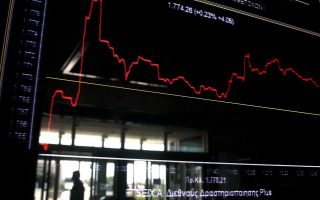Greek yields hit 13-year lows as eurozone bond spreads tighten

Greece’s 10-year government bond yields hit their lowest level in over 13 years on Monday, as encouraging headlines boosted sentiment and zero percent Bund yields pushed investors towards riskier investments.
Most eurozone bond yields are now at tighter spreads as investors move down the credit spectrum to pick up some yield, with German 10-year yields staying around zero percent before Wednesday’s European Central Bank meeting.
This effect has been magnified in Greece’s bond market as its recovery from a debt crisis continues. On Friday, eurozone finance ministers agreed to disburse 970 million euros as a grant to Greece as part of a post-bailout program, eurozone officials said.
In addition, officials told Reuters that Greece plans another foray into the bond markets in coming months to repay up to 4 billion euros of high-interest loans to the International Monetary Fund.
“We like the Greek story, plus you are getting a spread of 350 basis points over Germany, which is very favorable,” said Iain Stealey, international CIO of fixed income at JP Morgan Asset Management, one of the biggest funds in the world.
He said the fund had been investing in Greece for about a year now, and he sees value in Greek government bonds as well as covered bonds issued by Greek banks.
“There probably are still issues for Greece in the long term, but a majority of the debt is on the public side, which gives us comfort,” he said, referring to the fact that Greece’s largest creditors by far are the eurozone bailout funds ESM and EFSF.
On Monday, Greece’s 10-year bond yield dropped below the 3.50 percent mark for the first time since January 2006; by 0915 GMT, it was 6.7 basis points lower at 3.477 percent.
Several other eurozone government bonds are also benefiting from the low-yield environment.
Worries over the European economy, Germany in particular, have been compounded by political concern around Brexit and upcoming European parliamentary elections as investors shift to safe-haven government debt.
That pushed German 10-year Bund yields below zero last month. They hovered around zero on Monday with some large redemptions due.
“In the month of April, we will see 123 billion euros of backflows from coupons and redemptions. The ECB itself will get some 20 billion which it will reinvest,” said Commerzbank strategist Christoph Rieger. “With Bund yields where they are, this will accentuate the need for investors to go for yield.”
The influx of cash into the market is best seen in so-called “semi-core” government bonds, Rieger said: the likes of France, Belgium and Ireland, which have a high rating but a few notches below the likes of Germany and the Netherlands.
France’s 10-year bond yield spread over Germany is at its tightest in a month at around 35 basis points. Belgian and Irish equivalents are also at their tightest in weeks.
This spread tightening comes before an ECB meeting, as weakness in the economy and a whiff of panic among investors put the central bank back in the spotlight. [Reuters]





